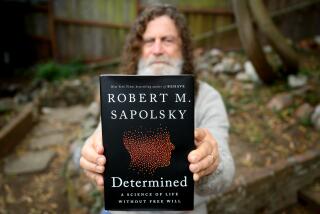Benjamin Libet, 91; physiologist probed consciousness
- Share via
Benjamin Libet, the UC San Francisco physiologist whose studies of the brain led to a new understanding of consciousness and brought into question the concept of free will, died July 23 at his home in Davis, Calif. He was 91.
Libet demonstrated that the brain starts responding to an external command before a person makes a conscious decision, suggesting that free will is a rationalization produced by the mind after the fact to explain its actions.
He also demonstrated that the mind has a very narrow window of opportunity to block such actions, a finding that suggested to some scholars that instead of a free will, the mind has a “free won’t.”
That veto power may not seem like much, he wrote in a 1999 essay, but it is enough to satisfy ethical standards. “Most of the Ten Commandments are ‘do not’ orders,” he wrote.
Libet had been conducting research on the brain for nearly 20 years when he began a series of experiments with the late Dr. Bertram W. Feinstein, a San Francisco neurosurgeon. Feinstein treated epilepsy patients by implanting electrodes deep in their brains and stimulating neural circuits.
Libet piggybacked onto those surgeries by measuring how long of a signal was required to elicit a response and how long that response took. He found that the electrical stimulus had to be maintained for at least half a second (500 milliseconds) before the patient became aware of it.
In a second series of experiments, he used electrodes attached to the scalp to measure brain activity and a second set of electrodes attached to fingers to measure their motion. Placing subjects in front of a rapidly moving clock, he would tell them to press a button with their finger or do some other activity and measure how long it took them to become aware of the decision to do it.
He observed mounting brain activity associated with the finger movement -- a previously observed phenomenon called Bereitschaftspotential, or readiness potential -- 300 milliseconds before the patient reported that he or she was aware of the conscious decision to move the finger and 200 milliseconds more before the action actually began.
That, he found, was enough time to allow the subject to halt the action.
“These discoveries have profound implications for the nature of free will, for individual responsibility and guilt,” he wrote.
Scientists and philosophers have debated his conclusions ever since, but no one has been able to propose a satisfactory alternative explanation for his findings.
Libet summarized his research in the 2004 book “Mind Time: The Temporal Factor in Consciousness.”
Neurobiologist Dr. Robert W. Doty of the University of Rochester said of the book that “his is almost the only approach yet to yield any credible evidence of how conscious awareness is produced by the brain. Libet’s work is unique and speaks to questions asked by all humankind.”
Benjamin Libet was born April 12, 1916, in Chicago, the first child of young Jewish immigrants from the Ukraine. His father and grandfather were both tailors, and English was not spoken in the home. Instead, young Benjamin learned it on the streets of the west side of Chicago, which was populated mainly by Jewish and Italian immigrants.
He had a powerful natural singing voice and, as a young boy, sang with well-known cantor Josef Rosenblatt.
Libet studied at the University of Chicago on a scholarship and received his doctoral degree in physiology in 1939 at age 23. During World War II, he was an instructor in physiology at the University of Pennsylvania and worked at the Army Air Forces’ materials engineering laboratory at Wright Field in Ohio.
After the war, he returned to the University of Chicago for four years before joining UC San Francisco in 1949. He formally retired in 1984 but continued working.
Libet is survived by his wife of 68 years, Fay; two sons, Julian Mayer Libet, a psychologist in Charleston, S.C., and Dr. Ralph Arnold Libet of Sacramento; and two daughters, Moreen Lea Libet, an anthropologist in Davis, and Gayla Bea Libet of Oakland.






